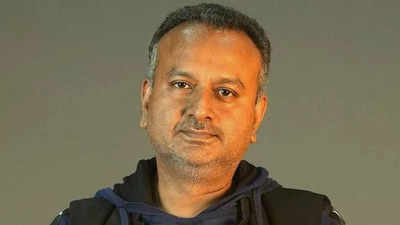- News
- entertainment
- hindi
- bollywood
- Director Shravan Tiwari is confident of his film Aazam's prospects, says "Pandemic and the declining star system have changed the film industry" - Exclusive
Trending
This story is from May 24, 2023
Director Shravan Tiwari is confident of his film Aazam's prospects, says "Pandemic and the declining star system have changed the film industry" - Exclusive
Director Shravan Tiwari sheds light on what sets Aazam apart and shares his influences and aspirations in the industry.

Shravan Tiwari, the director of Aazam, opens up about his passion for dark films and his journey as a filmmaker. Known for his work in mystery, gangster, and horror genres, Tiwari sheds light on what sets Aazam apart and shares his influences and aspirations in the industry.
I have always been drawn to mystery, gangster, and horror films. It's a genre that resonates with me, and I believe it's where my strengths lie.Aazam explores the world of gangsters, showcasing the dark aspects of their lives. When people ask me why I gravitate towards such genres, I find it hard to explain. I am both a consumer and creator of dark films, and they continue to fascinate me.
Jimmy Sheirgill praised the script of Aazam. Could you share more details about it?
Aazam is a story of succession, where one night has the power to change everything. In real life, there are many instances where a single night becomes a turning point. Just like Hitler capturing 79 people across Germany in one night, or Dawood Ibrahim experiencing a similar transformative night. Aazam captures this essence, exploring the impact of a crucial night on the characters' lives. The film is set in today's world, driven by technology. When writing a dark film, I often consider the lives of both real and fictional gangsters. While nobody desires their loved ones to become gangsters, people are captivated by gangster movies because they present human relationships from a different perspective, just like The Godfather or Road to Perdition. Challenging situations in human relationships make them intriguing.
I appreciate the films of Ram Gopal Varma, Anurag Kashyap's Ugly, and the works of Bimal Roy.
I have aspired to make films since I was a child. I spent a significant part of my life in Ahmedabad before moving to Mumbai three to four years ago. I shot most of Kamathipura while living in Ahmedabad. In my youth, I wanted to become an actor, but after completing college, I realized my true passion was filmmaking. I started writing scripts but faced obstacles because families don't typically support their children becoming gangsters or filmmakers.
I completed my MBA and attempted to join FTII (Film and Television Institute of India), but unfortunately, I couldn't get through. I returned to Ahmedabad and worked in news publications. I juggled my job during the week and devoted my weekends to filmmaking. I made films on a modest budget of 2.5-3 lakhs, writing and directing them.
My breakthrough came with The Last Don in 2014, which was based on the same gangster that inspired Shah Rukh Khan's Raees. I made numerous trips to the CBFC (Central Board of Film Certification) with the film, despite facing rejections. During that phase, I had the opportunity to meet the late Om Puri, who watched The Last Don after I left a DVD at his house. After seven months, he praised the film and insisted it be shown in film institutes. Om Puri was keen to know about my filmmaking process and the budget.
I had approached Om Puri for another film, but unfortunately, his health deteriorated, and he couldn't be a part of it. However, his support meant a lot to me. Eventually, I made 706 starring Atul Kulkarni. As balancing my job and filmmaking became overwhelming, I decided to quit my job and pursue filmmaking full-time.
I aim to continue making films in my preferred style rather than conforming to mainstream expectations. I don't want to compromise my vision and create something that doesn't align with my artistic sensibilities. While mainstream films may offer a wider reach, I believe that success can be achieved without relying on big stars or formulaic storytelling.
I don't face significant financial struggles because I edit my own films, which helps save costs during the shooting process. Aazam was shot in 22-25 days, but it doesn't feel rushed. Since I write my films, I have the freedom to make decisions about what needs to be changed and what should remain intact.
If I had made Aazam a few years ago, it would have been challenging to reach the audience. However, the pandemic and the decline of the star system have changed the landscape. People are more open to diverse content. PVR Pictures is releasing Aazam, and recent successes like The Kashmir Files and The Kerala Story indicate that it's difficult to predict which films will resonate with audiences. Additionally, with the rise of OTT platforms, even if a film doesn't perform well in theaters, there's still an opportunity to generate revenue. We attempted pre-release deals with some OTT platforms, but they didn't materialize. However, they have shown interest in acquiring the film after its theatrical run.
Censorship primarily affects the use of profanity, which is muted in my films. Kamathipura faced some issues with Hotstar, not the CBFC, and the title had to be changed to Tattoo Murders due to a local MLA's objections. Aazam has received a UA certificate with a few muted expletives. The film runs for two hours and doesn't feature a female lead. Although the producers initially considered adding an item song, upon seeing the rough cut, we collectively decided it wasn't necessary.
What makes the subject of Aazam special?
I have always been drawn to mystery, gangster, and horror films. It's a genre that resonates with me, and I believe it's where my strengths lie.Aazam explores the world of gangsters, showcasing the dark aspects of their lives. When people ask me why I gravitate towards such genres, I find it hard to explain. I am both a consumer and creator of dark films, and they continue to fascinate me.
Which filmmakers have influenced your inclination towards the dark genres?
It's hard to pinpoint a specific influence, but I find myself drawn to directors like Alfred Hitchcock and others who excel in creating intense and suspenseful films. Their work has made a lasting impression on me. My previous film, Kamathipura, was a dark thriller, and Aazam follows a similar path. The next film I'm working on revolves around a terrorist in Kashmir and maintains the same dark tone.
Aazam is a story of succession, where one night has the power to change everything. In real life, there are many instances where a single night becomes a turning point. Just like Hitler capturing 79 people across Germany in one night, or Dawood Ibrahim experiencing a similar transformative night. Aazam captures this essence, exploring the impact of a crucial night on the characters' lives. The film is set in today's world, driven by technology. When writing a dark film, I often consider the lives of both real and fictional gangsters. While nobody desires their loved ones to become gangsters, people are captivated by gangster movies because they present human relationships from a different perspective, just like The Godfather or Road to Perdition. Challenging situations in human relationships make them intriguing.
Are there any Indian filmmakers who have influenced your work?
I appreciate the films of Ram Gopal Varma, Anurag Kashyap's Ugly, and the works of Bimal Roy.
Can you share how your journey as a filmmaker began?
I have aspired to make films since I was a child. I spent a significant part of my life in Ahmedabad before moving to Mumbai three to four years ago. I shot most of Kamathipura while living in Ahmedabad. In my youth, I wanted to become an actor, but after completing college, I realized my true passion was filmmaking. I started writing scripts but faced obstacles because families don't typically support their children becoming gangsters or filmmakers.
I completed my MBA and attempted to join FTII (Film and Television Institute of India), but unfortunately, I couldn't get through. I returned to Ahmedabad and worked in news publications. I juggled my job during the week and devoted my weekends to filmmaking. I made films on a modest budget of 2.5-3 lakhs, writing and directing them.
My breakthrough came with The Last Don in 2014, which was based on the same gangster that inspired Shah Rukh Khan's Raees. I made numerous trips to the CBFC (Central Board of Film Certification) with the film, despite facing rejections. During that phase, I had the opportunity to meet the late Om Puri, who watched The Last Don after I left a DVD at his house. After seven months, he praised the film and insisted it be shown in film institutes. Om Puri was keen to know about my filmmaking process and the budget.
I had approached Om Puri for another film, but unfortunately, his health deteriorated, and he couldn't be a part of it. However, his support meant a lot to me. Eventually, I made 706 starring Atul Kulkarni. As balancing my job and filmmaking became overwhelming, I decided to quit my job and pursue filmmaking full-time.
What are your ambitions as a filmmaker?
I aim to continue making films in my preferred style rather than conforming to mainstream expectations. I don't want to compromise my vision and create something that doesn't align with my artistic sensibilities. While mainstream films may offer a wider reach, I believe that success can be achieved without relying on big stars or formulaic storytelling.
Do you face financial challenges while making films like Aazam?
I don't face significant financial struggles because I edit my own films, which helps save costs during the shooting process. Aazam was shot in 22-25 days, but it doesn't feel rushed. Since I write my films, I have the freedom to make decisions about what needs to be changed and what should remain intact.
How do you ensure your films reach the audience without a substantial number of screens?
If I had made Aazam a few years ago, it would have been challenging to reach the audience. However, the pandemic and the decline of the star system have changed the landscape. People are more open to diverse content. PVR Pictures is releasing Aazam, and recent successes like The Kashmir Files and The Kerala Story indicate that it's difficult to predict which films will resonate with audiences. Additionally, with the rise of OTT platforms, even if a film doesn't perform well in theaters, there's still an opportunity to generate revenue. We attempted pre-release deals with some OTT platforms, but they didn't materialize. However, they have shown interest in acquiring the film after its theatrical run.
Why did you choose Jimmy Sheirgill for the role in Aazam?
When considering the cast for Aazam, we were looking at actors like Raza Murad, Sayaji Shinde, Abhimanyu Singh, Anang Desai, and Ali Khan, each with their unique qualities. Aazam focuses on an underdog's story, and Jimmy Sheirgill's face doesn't possess the typical gangster look. His inclusion adds another layer of complexity to the casting. Initially, Jimmy declined the role due to his aversion to night shoots, but we convinced him, and he eventually agreed to be a part of the film.Have you faced any challenges with censorship?
Censorship primarily affects the use of profanity, which is muted in my films. Kamathipura faced some issues with Hotstar, not the CBFC, and the title had to be changed to Tattoo Murders due to a local MLA's objections. Aazam has received a UA certificate with a few muted expletives. The film runs for two hours and doesn't feature a female lead. Although the producers initially considered adding an item song, upon seeing the rough cut, we collectively decided it wasn't necessary.
End of Article
FOLLOW US ON SOCIAL MEDIA









